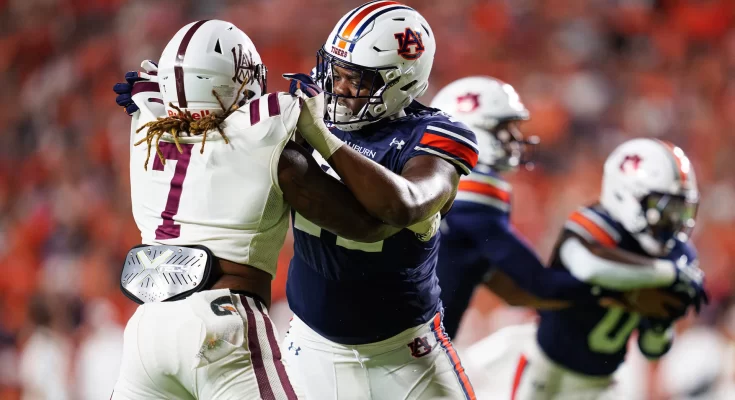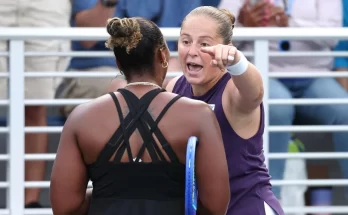Living the Dream on the Plains: Izavion Miller Reflects on Auburn Journey and Declares There’s Truly No Place Like Jordan-Hare Stadium.
Izavion Miller’s journey to the heart of Auburn football is more than just a story of athletic development—it’s a testament to identity, culture, and the magnetic pull of Jordan-Hare Stadium. For Miller, a talented and driven offensive lineman, the Plains have become more than a college town. They’re home. And when he says, “There’s truly no place like Jordan-Hare,” it isn’t just a soundbite. It’s a deeply felt truth that resonates through every part of his experience with the Auburn Tigers.
Miller wasn’t always destined to play on the hallowed turf of Jordan-Hare. Like many high school prospects with dreams of playing at the next level, he had options. But as he stepped onto Auburn’s campus for the first time during his recruitment, something felt different. The energy was palpable. The people weren’t putting on a show—they were genuinely passionate. Coaches, teammates, staff, and fans greeted him not just as a potential athlete, but as a future member of a family. That stuck with him. In a world where recruiting pitches often feel rehearsed, Auburn’s sincerity cut through the noise.
As Miller immersed himself in the program, the depth of Auburn’s culture became clearer. There’s a sacred rhythm to life on the Plains. Saturdays are a celebration of grit and unity. Teammates become brothers, coaches become mentors, and the fans become a second heartbeat. Miller quickly absorbed this ethos and began contributing to it with both his physical presence on the line and his vocal leadership off the field.
One of the defining aspects of Miller’s Auburn experience has been his relationship with Jordan-Hare Stadium. For outsiders, it’s a 87,000-seat structure—massive, imposing, filled with tradition. But for Miller, it’s a spiritual place. When he runs out of the tunnel to the roar of thousands, it feels like time slows. The crowd noise isn’t just background—it’s a force that lifts him. He hears the chants, the fight song, the cadence of Tiger fans in unison, and it’s impossible not to feel transformed.
He often speaks about the first time he played under the lights at Jordan-Hare. The nerves were there, of course, but so was an overwhelming sense of pride. Representing Auburn wasn’t just about wins and stats—it was about carrying forward a legacy that spans generations. Miller remembers looking into the stands and seeing not just students and locals, but entire families dressed in orange and blue, cheering for a program that’s part of their identity. In that moment, he realized how much responsibility and honor came with wearing the Auburn uniform.
The connection between player and place is rare in college athletics. Programs often churn through talent quickly, and not every player finds a deep bond with their school. But for Miller, Auburn clicked on every level. It wasn’t just the facilities or the gear or the big-game atmosphere. It was the sense that he belonged—that Auburn wasn’t just a stop on the way to something bigger, but a destination in its own right.
Hugh Freeze’s coaching staff recognized that spark in Miller from the beginning. They saw more than a blocker—they saw a culture-setter, someone who could embody what Auburn football stands for. That faith in Miller paid off. He emerged not just as a key player on the line, but as someone teammates looked to in the locker room. His work ethic became contagious. His film sessions grew longer. His offseason workouts intensified. And always, he did it not for personal accolades, but to elevate the team.
Off the field, Miller also found purpose. He became involved in community outreach, using his platform to inspire local youth. He visited schools, hosted camps, and often told the story of how believing in himself—and choosing a place that believed in him—changed his life. He reminded young athletes that hard work can be lonely, that the spotlight often comes only after years in the shadows, but that places like Auburn exist to nurture those willing to commit.
Academically, Miller thrived as well. He took advantage of Auburn’s support systems and forged strong relationships with professors and advisors. To him, being a student-athlete wasn’t just a label—it was a dual calling. He wanted to be as successful in the classroom as he was in the trenches. That balance gave him perspective, and it grounded him when football became overwhelming.
As the seasons passed, Miller’s appreciation for Jordan-Hare only deepened. Every snap he played in the stadium reinforced the sense that he was part of something lasting. Every Tiger Walk, every post-game celebration, every moment with fans reminded him why he chose Auburn in the first place. And each time he left the field, win or lose, he felt a gratitude that words couldn’t always express.
He began developing pregame rituals tied to the stadium. A specific path he’d walk during warmups. A few seconds spent alone at the 50-yard line before kickoff. A glance at the student section before strapping on his helmet. These small acts weren’t just habits—they were his way of paying tribute to the arena that had given him so much. To him, Jordan-Hare wasn’t just a venue. It was a sanctuary.
His bond with teammates also reflected the Auburn spirit. He often speaks of the offensive line room as a brotherhood built on mutual respect. They pushed each other relentlessly, whether it was in weight training or mastering blocking schemes. They shared laughs, endured frustrations, and leaned on each other when injuries or losses struck. And through it all, they knew they were building something that would outlast their time on campus.
Even in the face of adversity, Miller never wavered. During tough stretches of the season or difficult practices, he would remind younger teammates of the privilege they had. He’d tell them, “There are a lot of places to play football, but there’s only one Jordan-Hare.” That phrase became a mantra—a grounding force during long days and high-pressure games.
When the national media began to take notice of Miller’s performance, he appreciated the attention but kept his focus rooted in Auburn. He wasn’t chasing headlines. His goals were team-driven: to help the Tigers contend, to restore pride, to uphold tradition. He knew that success was sweetest when shared, and every accolade he received felt like a win for the program that had invested so deeply in him.
As he nears the end of his college career, Miller has begun to reflect more on his Auburn journey. He knows that someday the cheers will fade, the cleats will be hung up, and the lights of Jordan-Hare will shine for new faces. But he also knows that his time here will never leave him. The lessons learned, the friendships forged, the moments under the lights—they’re etched into who he is.
He hopes to play professionally, of course, and he’s well on his way. Scouts are intrigued by his size, intelligence, and leadership. But no matter where the future takes him, he’ll carry Auburn with him. Every time he takes the field, even if it’s in a different jersey, a piece of Jordan-Hare will be there too. That’s the magic of finding a place that fits—not just your game, but your soul.
In interviews, when asked what makes Auburn different, Miller never hesitates. “It’s the people, the pride, and the place,” he says. “There’s truly no place like Jordan-Hare.” And when he says it, it doesn’t sound rehearsed or scripted. It sounds lived-in, heartfelt, and absolutely true.
His story is a reminder of what college football at its best can be—a convergence of talent, heart, and place. Izavion Miller didn’t just find a team at Auburn. He found a home, a purpose, and a stage where he could become the best version of himself. And for fans who’ve watched him grow and lead, his presence is a symbol of what it means to wear the Auburn jersey with pride. Jordan-Hare may be made of steel and stone, but it’s players like Miller who give it soul.



